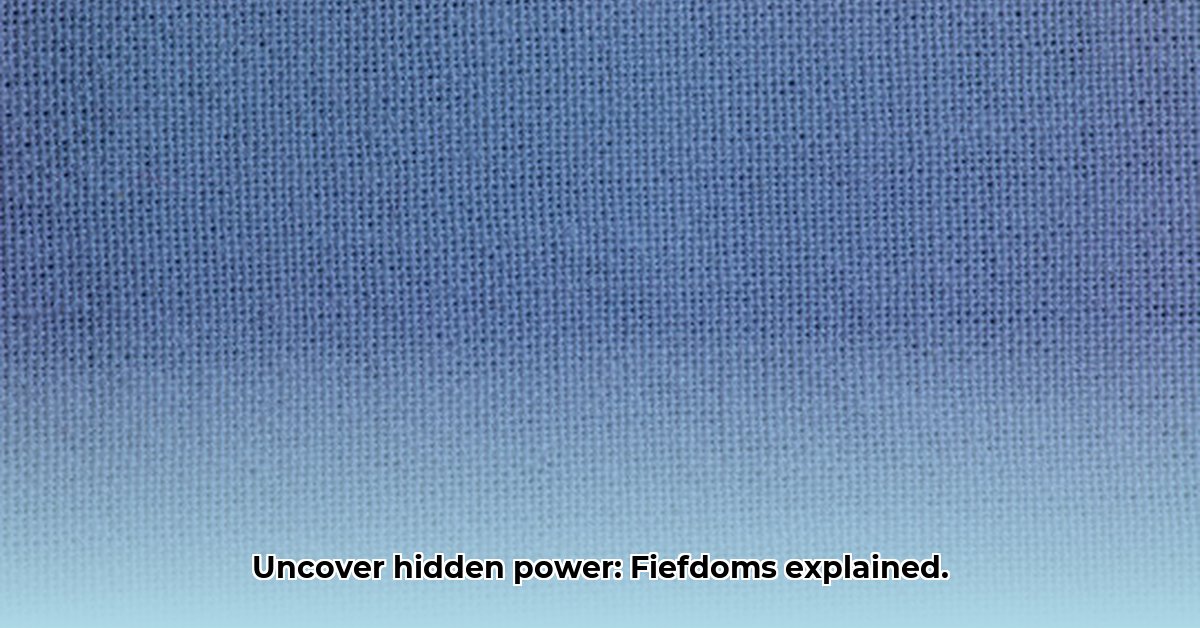
Imagine a medieval king, ruling his tiny kingdom unchallenged. That’s the essence of a fiefdom – concentrated power with little accountability. While castles and knights are long gone, the concept of unchecked authority remains surprisingly relevant in today's world. This article explores the meaning of "fiefdom" in the modern context, examining its various manifestations and proposing strategies to curb its negative impact.
A Quick History Lesson: Understanding the Roots of "Fiefdom"
The term "fiefdom" originates from the medieval era, referring to land granted by a monarch to a noble in exchange for loyalty and service 1. This feudal system concentrated power, often without significant input from the general populace. This historical context lays the groundwork for understanding modern-day fiefdoms, where unchecked power, rather than land, is the prized possession.
Fiefdoms Today: It's Not Just About Kings Anymore
Modern fiefdoms aren't about land; they represent situations where individuals, groups, or departments wield disproportionate control with minimal accountability. Think of a CEO making unilateral decisions without consulting employees or shareholders, or a government agency operating opaquely, hindering public scrutiny. These are all modern examples of fiefdoms – concentrated power structures enabling potential abuse.
What Makes a Modern Fiefdom Tick? Key Characteristics
Several hallmarks distinguish a modern fiefdom. Firstly, power is highly centralized, with decision-making concentrated in the hands of a few. Secondly, transparency is often lacking, making it difficult to monitor activities. Accountability is frequently absent, making it challenging to hold those in power responsible. Lastly, fiefdoms often prove inefficient, stifling innovation and collaboration.
The Downsides: Why Unchecked Power Is a Problem
Unchecked power leads to various negative consequences. Inefficiency and waste thrive in the absence of oversight, potentially delaying or derailing projects. Corruption flourishes in environments lacking transparency and accountability. This can lead to the misuse of public funds and undermine public trust. Moreover, fiefdoms erode democratic norms, concentrating decision-making power in the hands of a select few and diminishing citizen influence. Isn't it concerning that these consequences persist in our supposedly more democratic times?
Fighting Back: Strategies to Tackle Modern Fiefdoms
Combating modern fiefdoms requires a multi-pronged approach:
Enhance Transparency: Mandating open operations, regular audits, easily accessible financial reports, and clear explanations of decision-making processes are crucial. This open approach acts as a powerful deterrent against misuse of power.
Strengthen Oversight: Independent bodies with the authority to investigate, scrutinize, and hold those in power accountable are essential. These bodies must be free from political influence and have robust investigative powers and the ability to impose meaningful sanctions.
Empower Watchdogs: Support investigative journalism, non-profit organizations, and activist groups dedicated to scrutinizing power structures. Their vigilance is a cornerstone of holding power accountable.
Educate the Public: Promote critical thinking and civic engagement. Enable citizens to identify the characteristics of fiefdoms and participate actively in governance. An informed and engaged citizenry is the most effective check on power.
A Risk Assessment: Weighing the Dangers
The table below highlights the risks associated with modern fiefdoms and potential mitigation strategies:
| Risk Factor | Likelihood | Impact | Mitigation Strategy |
|---|---|---|---|
| Corruption | High | Severe | Strengthened independent oversight, whistleblower protection, transparent procurement |
| Inefficiency | High | Significant | Improved inter-agency collaboration, performance metrics, regular evaluations |
| Lack of Accountability | High | High | Citizen engagement, public access to information, independent audits |
| Erosion of Democratic Norms | Moderate | Severe | Institutional checks and balances, promoting civic participation, media scrutiny |
The potential for serious negative consequences is substantial. Addressing these risks proactively is crucial for maintaining good governance and public trust.
The Ongoing Fight for Balance
Understanding the modern relevance of “fiefdom” is vital. The fight against concentrated power is ongoing. Proactive measures promoting transparency, strengthening oversight, and empowering citizens are crucial for establishing a fair and equitable society. The future of responsible governance depends on it.